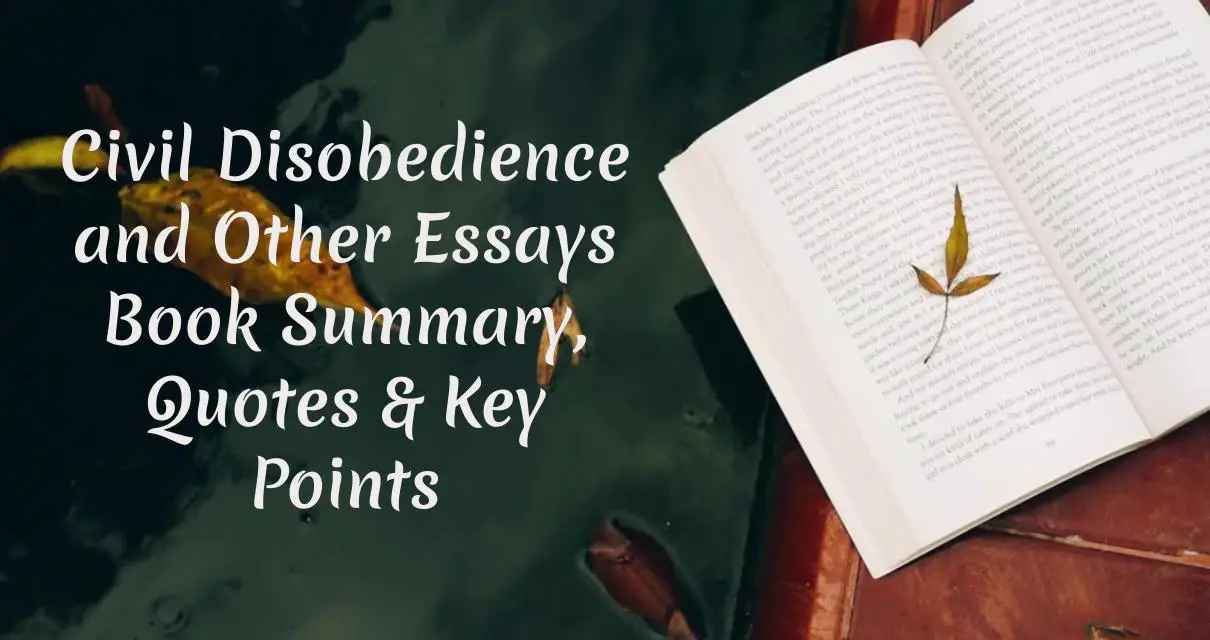The book "Civil Disobedience and Other Essays" is a collection of essays written by Henry David Thoreau, a prominent American philosopher, and writer. The book revolves around the theme of civil disobedience, individualism, and the relationship between the individual and the state.
Table of Content
Civil Disobedience and Other Essays Key Points
Individualism
Thoreau emphasizes the importance of individualism and encourages people to follow their own conscience rather than blindly following the laws set by the government. He believed that individuals should be self-reliant and should not conform to society's expectations.
Civil Disobedience
Thoreau argues that civil disobedience is a necessary tool for bringing about social change and that individuals have a moral obligation to disobey unjust laws. He believed that individuals should not be afraid to stand up for what they believe in, even if it means breaking the law.
The Relationship between the Individual and the State
Thoreau believes that the state should not have absolute power over the individual and that individuals have the right to rebel against the state if it becomes oppressive. He believed that individuals should not blindly follow the government's laws and should instead question their authority.
Civil Disobedience and Other Essays Book Review
The book is a thought-provoking read that challenges the reader to question their own beliefs and values. Thoreau's writing is clear and concise, making complex ideas easy to understand. The essays are still relevant today and offer valuable insights into the relationship between the individual and the state. Thoreau's ideas on civil disobedience and individualism continue to inspire people to stand up for what they believe in and fight for social justice.
Civil Disobedience and Other Essays Quotes
"If the injustice is part of the necessary friction of the machine of government, let it go, let it go: perchance it will wear smooth--certainly the machine will wear out. If the injustice has a spring, or a pulley, or a rope, or a crank, exclusively for itself, then perhaps you may consider whether the remedy will not be worse than the evil; but if it is of such a nature that it requires you to be the agent of injustice to another, then, I say, break the law. Let your life be a counter-friction to stop the machine."
"The government itself, which is only the mode which the people have chosen to execute their will, is equally liable to be abused and perverted before the people can act through it."
FAQs for Civil Disobedience and Other Essays
1. What is the main theme of the book?
The main theme of the book is civil disobedience, individualism, and the relationship between the individual and the state.
2. What is Thoreau's view on individualism?
Thoreau emphasizes the importance of individualism and encourages people to follow their own conscience rather than blindly following the laws set by the government.
3. What is civil disobedience according to Thoreau?
Thoreau argues that civil disobedience is a necessary tool for bringing about social change and that individuals have a moral obligation to disobey unjust laws.
4. What is the role of the state in Thoreau's philosophy?
Thoreau believes that the state should not have absolute power over the individual and that individuals have the right to rebel against the state if it becomes oppressive.
5. What is Thoreau's opinion on unjust laws?
Thoreau believed that individuals should not blindly follow the government's laws and should instead question their authority.
6. What is the significance of the title of the book?
The title of the book reflects its main theme of civil disobedience and other essays that explore the relationship between the individual and the state.
7. What is the relevance of the book in today's world?
The book is still relevant today and offers valuable insights into the relationship between the individual and the state. Thoreau's ideas on civil disobedience and individualism continue to inspire people to stand up for what they believe in and fight for social justice.
8. What is the writing style of the book?
Thoreau's writing is clear and concise, making complex ideas easy to understand.
9. What is Thoreau's opinion on the government?
Thoreau believed that the government should not have absolute power over the individual and that individuals have the right to rebel against the state if it becomes oppressive.
10. What is the message of the book?
The book's message is that individuals should not blindly follow the laws set by the government and should instead question their authority. Thoreau believed that civil disobedience is a necessary tool for bringing about social change and that individuals have a moral obligation to disobey unjust laws.

